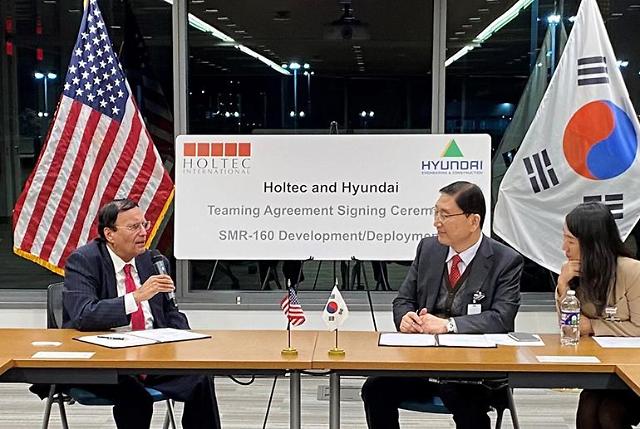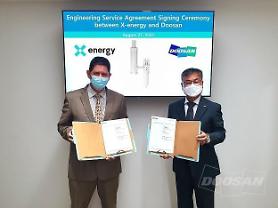
[Courtesy of Hyundai E&C]
Under a teaming agreement, Hyundai E&C and Holtec would jointly develop a commercialization model, promote joint projects and participate in marketing and bidding together. Small modular reactors (SMRs) allow for less on-site construction, increased containment efficiency, and enhanced safety.
Hyundai E&C, affiliated with South Korea's Hyundai auto group, said it would solidify its position as a key player in SMR. Holtec's SMR-160 is a pressurized water reactor with a capacity of 160-megawatt electrical (MWe) that does not rely on any pumps or motors to remove heat from the nuclear fuel.
"Through this contract, we have laid the groundwork to move away from orders and construction-oriented businesses to a pre-construction solution partner such as the development of new technologies, global sales, purchase, and construction," Hyundai E&C CEO Yoon Young-joon said in a statement on November 24.
Yoon said his company would be reborn as a total solution creator that encompasses all areas from investment and development to operation by focusing all our efforts on promoting new businesses such as automation and smart cities.
Holtec's SMR-160 verified its safety through potential virtual risk simulation, Hyundai E&C said, adding the reactor can be installed on small sites and linked to existing small modular nuclear power plants. SMR-160 is seeking approval from the Nuclear Regulatory Commission, a U.S. government agency.
South Korea has adopted a new energy policy to accelerate the development of advanced SMRs. South Korean scientists are trying to design concepts for a micro modular reactor (MMR) that could be used for about 40 years without changing fuel.
The state-run Korea Atomic Energy Research Institute (KAERI) has partnered with Samsung Heavy Industries to develop a small carbon-free fission reactor based on molten salt that would be used for ships and floating nuclear power plants. Molten salt reactors (MSRs) can reduce expensive containment structures, eliminate hydrogen as a source of explosion risks, and do not produce radioactive fission gases.
Copyright ⓒ Aju Press All rights reserved.


![[FOCUS] Environmental activists oppose development of advanced small modular reactors](https://image.ajunews.com/content/image/2021/06/18/20210618093752767200_278_163.jpg)
